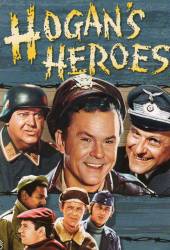Deliberate mistake: The film crew did not always bother to switch out the rank insignia on the uniforms of extras. In this episode, that leads to all kinds of enlisted and noncom rank insignia being present in the lineup of brand-new recruits when Klink inspects them. Rightfully they should all wear a single eagle on a borderless patch of a Flieger on their collar.
Revealing mistake: As Burkhalter's car comes into the camp, it's easy to see that it's a re-use of stock footage.
Continuity mistake: When the Hof Brau is shown, the door is white and opens outwards, and no shrubbery. When Le Beau comes in, the door is completely different, opens inwards, and has a trellis and shrubbery by it.
Factual error: In this episode, the HofBrau (which should correctly be written "Hofbräu") is displaying a big red neon sign above its door. From 1939 on, air raid regulations throughout Germany strictly prohibited any unnecessary display of light at night. Any light visible from more than 500m away was considered a breach of air raid regulations.
Audio problem: After Schultz discovers the boys in the cannon plant, Hogan lifts a cannon up and taps the metal inside. If you watch closely, he only taps three times, but there are four tap sounds.
Continuity mistake: Burkhalter and Hans Spear are seated at the table in Klink's office and Burkhalter pours brandy for himself and Spear. After the camera goes through several quick cuts, you see the shot glasses empty without having been moved.






Answer: It's a comedy, not a documentary.
stiiggy
Perhaps it was counterfeit. There are numerous episodes where they deal in counterfeit monies.